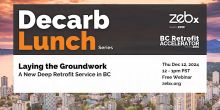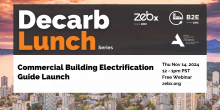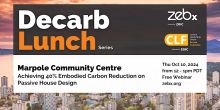Decarb Lunch: Laying the Groundwork - A New Deep Retrofit Service in BC
Deep energy retrofits are a critical piece of achieving our carbon pollution reduction targets and improving the comfort of homes and workplaces. Programs offered as part of the BC Retrofit Accelerator provide guidance to building owners to identify and plan for retrofit projects to significantly reduce building emissions, including commercial and multi-unit residential strata, rental, non-market, and off-reserve Indigenous housing.











